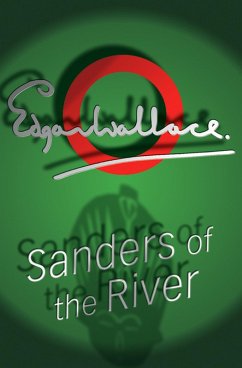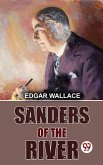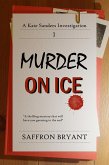Edgar Wallace
Sanders Of The River (eBook, ePUB)
4,99 €
4,99 €
inkl. MwSt.
Sofort per Download lieferbar

2 °P sammeln
4,99 €
Als Download kaufen

4,99 €
inkl. MwSt.
Sofort per Download lieferbar

2 °P sammeln
Jetzt verschenken
Alle Infos zum eBook verschenken
4,99 €
inkl. MwSt.
Sofort per Download lieferbar
Alle Infos zum eBook verschenken

2 °P sammeln
Edgar Wallace
Sanders Of The River (eBook, ePUB)
- Format: ePub
- Merkliste
- Auf die Merkliste
- Bewerten Bewerten
- Teilen
- Produkt teilen
- Produkterinnerung
- Produkterinnerung

Bitte loggen Sie sich zunächst in Ihr Kundenkonto ein oder registrieren Sie sich bei
bücher.de, um das eBook-Abo tolino select nutzen zu können.
Hier können Sie sich einloggen
Hier können Sie sich einloggen
Sie sind bereits eingeloggt. Klicken Sie auf 2. tolino select Abo, um fortzufahren.

Bitte loggen Sie sich zunächst in Ihr Kundenkonto ein oder registrieren Sie sich bei bücher.de, um das eBook-Abo tolino select nutzen zu können.
Commissioner Sanders is called upon by the British Government 'to keep a watchful eye upon some quarter of a million cannibal folk, who ten years before had regarded white men as we regard the unicorn.' Written when world powers were vying for colonial honour, Sanders of the River encapsulates the beliefs and assumptions that motivated such quests. There is religious-palava, raiding-palava, and all the while, Bosambo, magnificent chief of the Ochori watches on.
- Geräte: eReader
- mit Kopierschutz
- eBook Hilfe
- Größe: 1.06MB
Andere Kunden interessierten sich auch für
![Sanders Of The River (eBook, ePUB) Sanders Of The River (eBook, ePUB)]() Edgar WallaceSanders Of The River (eBook, ePUB)1,99 €
Edgar WallaceSanders Of The River (eBook, ePUB)1,99 €![Sanders (eBook, ePUB) Sanders (eBook, ePUB)]() Edgar WallaceSanders (eBook, ePUB)4,99 €
Edgar WallaceSanders (eBook, ePUB)4,99 €![The Complete Sanders of the River Series (eBook, ePUB) The Complete Sanders of the River Series (eBook, ePUB)]() Edgar WallaceThe Complete Sanders of the River Series (eBook, ePUB)9,90 €
Edgar WallaceThe Complete Sanders of the River Series (eBook, ePUB)9,90 €![Sanders of the River (eBook, ePUB) Sanders of the River (eBook, ePUB)]() Edgar WallaceSanders of the River (eBook, ePUB)0,90 €
Edgar WallaceSanders of the River (eBook, ePUB)0,90 €![The Lawrence Sanders Thriller Collection Volume Two (eBook, ePUB) The Lawrence Sanders Thriller Collection Volume Two (eBook, ePUB)]() Lawrence SandersThe Lawrence Sanders Thriller Collection Volume Two (eBook, ePUB)13,95 €
Lawrence SandersThe Lawrence Sanders Thriller Collection Volume Two (eBook, ePUB)13,95 €![Bones Of The River (eBook, ePUB) Bones Of The River (eBook, ePUB)]() Edgar WallaceBones Of The River (eBook, ePUB)4,99 €
Edgar WallaceBones Of The River (eBook, ePUB)4,99 €![Murder on Ice (A Kate Sanders Investigation, #1) (eBook, ePUB) Murder on Ice (A Kate Sanders Investigation, #1) (eBook, ePUB)]() Saffron BryantMurder on Ice (A Kate Sanders Investigation, #1) (eBook, ePUB)2,99 €
Saffron BryantMurder on Ice (A Kate Sanders Investigation, #1) (eBook, ePUB)2,99 €-
-
-
Commissioner Sanders is called upon by the British Government 'to keep a watchful eye upon some quarter of a million cannibal folk, who ten years before had regarded white men as we regard the unicorn.' Written when world powers were vying for colonial honour, Sanders of the River encapsulates the beliefs and assumptions that motivated such quests. There is religious-palava, raiding-palava, and all the while, Bosambo, magnificent chief of the Ochori watches on.
Produktdetails
- Produktdetails
- Verlag: House of Stratus
- Seitenzahl: 186
- Erscheinungstermin: 1. Oktober 2015
- Englisch
- ISBN-13: 9780755122691
- Artikelnr.: 37827209
- Verlag: House of Stratus
- Seitenzahl: 186
- Erscheinungstermin: 1. Oktober 2015
- Englisch
- ISBN-13: 9780755122691
- Artikelnr.: 37827209
- Herstellerkennzeichnung Die Herstellerinformationen sind derzeit nicht verfügbar.
Richard Horatio Edgar Wallace was born illegitimately in Greenwich, London, in 1875 to actors Mary Jane Richards and T.H. Edgar. As an infant he was adopted by George Freeman, a porter at Billingsgate fish market. Aged eleven, Wallace sold newspapers at Ludgate Circus and upon leaving school took a job with a printer. He later enlisted in the Royal West Kent Regiment, before transferring to the Medical Staff Corps, and was sent to South Africa. In 1898, he published a collection of poems called 'The Mission that Failed', and subsequently left the army to become correspondent for Reuters. South African war correspondent for 'The Daily Mail' followed and his articles were later published as 'Unofficial Dispatches'. His outspokenness infuriated Lord Kitchener, who removed his credentials. He then edited the 'Rand Daily Mail', but gambled disastrously on the South African Stock Market. Returning to England, Wallace at first reported on crimes and hanging trials, before becoming editor of 'The Evening News'. It was in 1905 that he founded the Tallis Press, publishing 'Smithy', a collection of soldier stories, and 'The Four Just Men'. The latter was published with the ending removed as an advertising stunt and he offered oe500 to readers who could successfully guess the ending. Unfortunately, many did and he was almost bankrupted. At various times Wallace also worked as a journalist on 'The Standard', 'The Star', 'The Week-End Racing Supplement' and 'The Story Journal'. In 1917, he became a Special Constable at Lincoln's Inn and also a special interrogator for the War Office. The Daily Mail sent Wallace to investigate atrocities in the Belgian Congo, a trip that provided material for his 'Sanders of the River' books. In 1923, he became Chairman of the Press Club and in 1931 stood as a Liberal Parliamentary candidate for Blackpool. Wallace's first marriage in 1901 to Ivy Caldecott, daughter of a missionary, ended in divorce in 1918 and he later married his much younger secretary, Violet King. Along with countless articles, some 23 screenplays and many short stories, Wallace wrote more than 170 books, which have been translated into 28 languages and sales of which have exceeded 50 million copies. Over 160 films have been made from his books - more than any other author. In the 1920's one of Wallace's many publishers claimed that a quarter of all books read in England were written by him. His sales were exceeded only by 'The Bible'. He died in 1932 whilst working on the screenplay for 'King Kong', having moved to Hollywood after being offered a contract by RKO.







